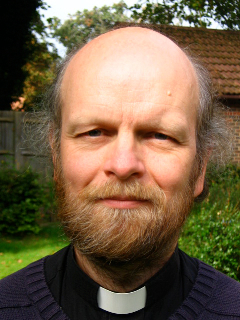Opinion Column

Should we be pursuing a humbler future?
Regular contributor Andy Bryant questions whether the pursuit of growth is really the fairest answer to the cost-of-living crisis, and challenges us to consider our nation’s role in God’s creation.
In one of his last speeches as Prime Minister Boris Johnson stated that although the months ahead are going to be very tough, Britain will emerge stronger and more prosperous on the other side and that “our bounce back can and should be remarkable and that our future will be golden”.
This is the kind of rhetoric on which Boris thrives – an optimism in the face of challenges. He adopted a similar approach through the pandemic. The hope was that we could “build back better”. Others similarly hoped that the lessons learnt from the pandemic, and the experience of lockdown, could change the way we do things. Sadly, there seems little evidence that this has been the case.
But, is bouncing back stronger and more prosperous what we really need? By contrast President Macron has made a speech in which he has spoken of the end of the age of abundance. My hope would be that we could emerge from this cost-of-living crisis with a greener, more just, and humbler society.
Whilst the immediate cause of the present eye-watering hikes in energy costs are linked to Russia’s invasion of Ukraine, the real culprit is our love affair with fossil fuels. We have for too long craved cheap fuel, turning a blind eye to where it was coming from or what it is doing to our environment. The lifestyle we have grown used to is built on fossil fuels and we do not know how to live without them.
Whilst we have made some strides down the green fuel agenda, the danger in the present crisis is that we would turn to increased North Sea production and the introduction of fracking. The green levy, that helps promote sustainable energy, is suddenly seen as expendable, and solar farms have been declared unsightly - as if gas fired power stations were a thing of beauty. The only lasting way out of our present energy crisis is to end our love affair with fossil fuels.
The rising cost of living also once again highlights the inequalities that infect our world, both globally and nationally. We are able to sustain supplies of liquid gas to this country because we can outbid other countries. Fuels shortages are a global issue, but the West can use its financial muscle to ensure supplies. Many other countries are not so fortunate and the gap between rich and poor nations just continues to grow.
And nationally similar inequalities exist. It is profoundly unjust that the poorer you are the more you will have to pay for energy for your home. During the pandemic we all learnt to be thankful for key workers, but they still remain among the most poorly paid. The weekly applause they received is now a distant and fading memory whilst they watch their bosses receive large pay rises and shareholders their dividends. The inequalities that beset our nation have never been more apparent but too often go unchallenged.
Come what may we want to all maintain our expected standard of living, and long for that golden future we have been promised. We forget that maintaining what we have so often means others go without. For too long we have depended on foreign workers to picking our crops, doctors and nurses from overseas to run our health service, and just assumed we have priority access to the world’s resources. Our levels of consumption are unsustainable and an economy that is always growing means someone, somewhere, is missing out.
As a nation we need to discover a humbler way of being alongside other nations in the global family, learning to balance our needs with the needs of others, accepting that we need to have less so that others can simply live.
The present harsh reality of the rising cost of living is a wake up call. It is a sign that significant and major changes are needed globally, nationally, and locally. Profound and deep adjustments are needed.
Learning to be a greener, more just and humbler society is a call to learn to walk more gently and compassionately on this earth. We need to learn to put God, not ourselves at the centre of all things and to learn to see with God’s eyes and feel with God’s heart. We need to remember both who we are and whose we are.
We need to learn once again to walk with God in the quiet of the evening; to learn to live more in harmony both with the Creator and the creation. We need to heed the ancient cry: to do justly, to love mercy and walk humbly with our God. It is not a stronger, more prosperous future we need but one more faithful to God and more Christ-shaped in its lived reality.
The image above is courtesy of cottonbro on pexels.com
 The Revd Andrew Bryant is the Canon for Mission and Pastoral Care at Norwich Cathedral. He was previously Team Rector of Portishead, Bristol, in the Diocese of Bath and Wells, and has served in parishes in the Guildford and Lichfield Dioceses, as well as working for twelve years with Kaleidoscope Theatre, a charity promoting integration through theatre for young adults with Down’s Syndrome.
The Revd Andrew Bryant is the Canon for Mission and Pastoral Care at Norwich Cathedral. He was previously Team Rector of Portishead, Bristol, in the Diocese of Bath and Wells, and has served in parishes in the Guildford and Lichfield Dioceses, as well as working for twelve years with Kaleidoscope Theatre, a charity promoting integration through theatre for young adults with Down’s Syndrome.
You can read Andrew's latest blog entry here and can follow him via his Twitter account @AndyBry3.
The views carried here are those of the author, not of Network Norwich and Norfolk, and are intended to stimulate good-natured and constructive debate between website users.
We welcome your thoughts and comments, posted below, upon the ideas expressed here.
Click here to read our forum and comment posting guidelines